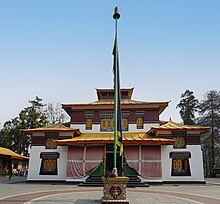| Enchey Monastery | |
|---|---|
 Enchey Monastery | |
| Religion | |
| Affiliation | Tibetan Buddhism |
| Sect | Nyingma |
| Festivals | Chaam Dance, Singhe Chaam, and Pang Lhabsol |
| Location | |
| Location | East Sikkim, Sikkim, India |
| Country | India |
| Geographic coordinates | 27°20′9″N 88°37′9″E / 27.33583°N 88.61917°E |
| Architecture | |
| Style | Tibetan |
| Founder | Lama Druptab Karpo |
| Date established | 1840 |
The Enchey Monastery was established in 1909 above Gangtok, the capital city of Sikkim in the Northeastern Indian state. It belongs to the Nyingma order of Vajrayana Buddhism. The monastery built around the then small hamlet of Gangtok became a religious centre. The location was blessed by Lama Drupthob Karpo, a renowned exponent of tantric (adept) art in Buddhism with flying powers; initially a small Gompa was established by him after he flew from Maenam Hill in South Sikkim to this site. The literal meaning of Enchey Monastery is the "Solitary Monastery".[1][2][3][4] Its sacredness is attributed to the belief that Khangchendzonga and Yabdean – the protecting deities – reside in this monastery. As, according to a legend, Guru Padmasambhava had subdued the spirits of the Khangchendzonga, Yabdean and Mahākāla here. In view of this legend, the religious significance of Enchey Monastery is deeply ingrained in every household in Gangtok. It is also believed that these powerful deities always fulfil the wishes of the devotees.[5]
- ^ Bindloss, Joe (2009). Northeast India. Lonely Planet. p. 179. ISBN 978-1-74179-319-2. Retrieved 20 October 2001.
- ^ Bisht, Ramesh Chandra (2008). International Encyclopaedia of Himalayas (5 Vols. Set). Mittal Publications. p. 225. ISBN 978-81-8324-265-3. Retrieved 1 June 2010.
- ^ "Enchey Monastery". National Informatics Centre. Archived from the original on 22 May 2010. Retrieved 1 June 2010.
- ^ "Enchey Monastery". Buddhist Temples. Retrieved 1 June 2010.
- ^ Cite error: The named reference
sikkimwas invoked but never defined (see the help page).

